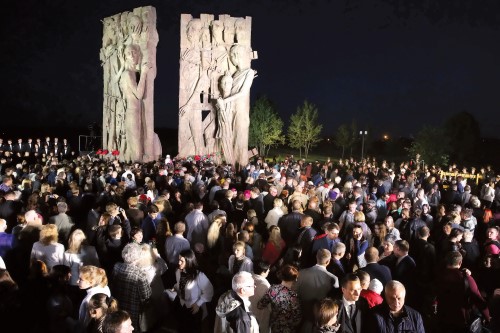
Trostenets stands alongside Auschwitz, Majdanek and Treblinka in having destroyed the Jews of Belarus, and of other countries across Europe. Partisans, undergrounders and captive Red Army solders were also killed there…
The evening on which the Gates of Memory memorial opened was both crowded and unusually silent (not only during the minute of silence). Eternity spoke to every heart, and mournful music wrung at the souls of those present. Wreaths were laid, with burning icon lamps inside: bouquets of wild flowers twined with dark ribbon. Meanwhile, light-emitting diode photos of prisoners from the camps, including Trostenets, dissolved in each flame: invisible participants of the ceremony.
The commemorative gathering brought together victims of Nazism, veterans, and former prisoners of concentration camps and ghettos, as well as representatives of the diplomatic corps, and visitors from abroad. In this place, impregnated with blood and suffering, the President of Belarus laid his wreath, stating, “We revere and will always remember the victims of that war. The erection of the memorial in Trostenets is a point of honour for Belarusians.”
The memorial is a public project, funded from charitable donations by individuals and organisations. A day of unpaid work (a subbotnik) also helped in completing the project.
Mr. Lukashenko expressed words of deep gratitude to all who had helped with the work, saying, “Let this monument help unite people for the sake of good and mercy. Let it remind us, our children and our grandchildren, that we should appreciate and preserve peace, and public consent. Let it prevent us from forgetting the monstrous tragedies arising from Nazism ideals: intolerance and an aspiration to forcibly impose will. We should strive to preserve the principles of humanism and mutual respect, as well as our historical memory, so that these always triumph on Earth.”
Mr. Lukashenko warned against attempts to rewrite the history of the Great Patriotic War, commenting that, recently, people have asked why such memorials are relevant, suggesting that we set aside the past. “These seemingly harmless words hide issues of deeper concern; in forgetting, we rewrite war history, ignoring the feats of our people. We must not forget or give this Great Victory to anyone else. It is evidence of the greatness of the Soviet people, whose descendants we are.”
At the close of the meeting, Mr. Lukashenko wished those gathered peace, happiness and a good life. He chatted with members of the diplomatic corps and clergy, but spent longer with veterans, saying, “Live, I beg of you. It is a pity that very few veterans remain alive today. Nevertheless, you live!”
By Alexander Pimenov











